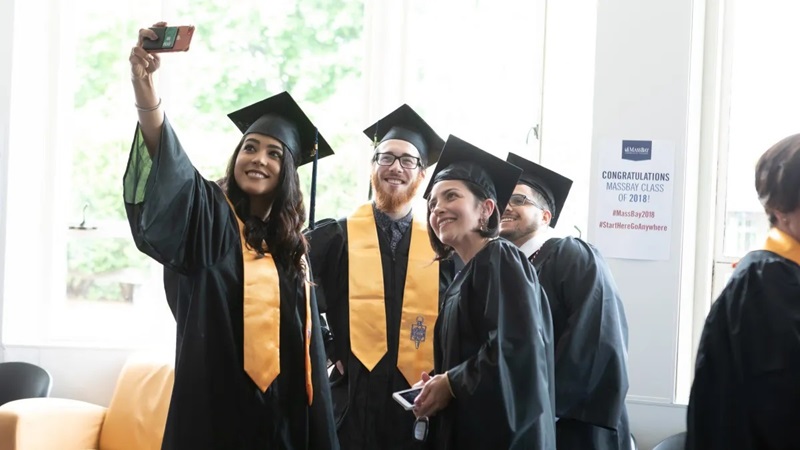Tuition waiver is least we can do for ‘grandfamilies’
Proposal would offer tuition-free education at state colleges to young people being raised by grandparents
By Janelle Fassi

MassBay Community College students commemorate their graduation in 2018 with a selfie. (MassBay Community College Facebook photo)
GRANDPARENTS ACROSS THE country have been increasingly stepping up to raise grandchildren. Children of all races, ages, and socioeconomic levels live in homes with grandparents as their primary caregivers, arrangements sometimes known as “grandfamilies.”
In Massachusetts, there were a total of 31,404 grandparents raising 30,822 minor grandchildren, both with and without a parent present, according to 2022 data from the American Community Survey.
A primary reason why grandparents have stepped in to take on this role in recent years has been the nation’s opioid crisis, whose grip has left some parents unable to care for their children. Other reasons include child abuse and neglect, parental illness or death, incarceration, and military deployment.
While some of these grandfamily arrangements are sanctioned by state child welfare systems that assign formal guardianship to grandparents or approve adoptions, the overwhelming share of grandparents in this role (94 percent) care for their grandchildren in informal arrangements set up outside the child welfare system. While there are a variety of reasons grandparents enter informal arrangements, they typically choose this structure to have greater control over their own decision-making.
The day-to-day responsibilities of grandfamilies in informal arrangements and those operating through the child welfare system are the same, but the help they get from the state is not.
Grandfamilies that have formed through the child welfare system are entitled to a range of financial assistance grants, ranging from monthly foster care payments to Social Security benefits. While it might not be feasible to extend that help to the thousands of grandfamilies that sit outside the child welfare system, Massachusetts offers one benefit to families in the state system that should be made available to all young people being raised by grandparents or other caregivers.
Under a state program, all of those 24 years old and younger who were adopted or whose caregivers were granted custody through the Department of Children and Families are eligible to have 100 percent of tuition and fees waived at any public college or university in Massachusetts.
The tuition and fee waiver program can be an enormous financial relief to grandparents, who are often struggling to finance their own retirement. The added financial burden of raising their grandchildren is already a strain for many; taking on the further responsibility of helping to pay for college is often out of the question. But that is exactly the situation faced by the vast majority of Massachusetts grandfamilies, who are not eligible for the tuition and fee waiver under the current system.
A bill pending in the Legislature (House 1257, Senate 819) would provide tuition and fee waivers at all state colleges and universities to children being raised by a legally recognized caregiver such as a grandparent or relative. This measure would provide equity to these caregivers and the many children raised by relatives outside the child welfare system.
Business Insider estimated the annual cost of raising one child in 2024 was at least $25,714, excluding the cost of higher education. According to the American Community Survey, grandparent caregivers earn about 47 percent of the median family income in Massachusetts ($43,039 compared to $90,892) and about half are still working. Many grandfamilies cannot rely on the grandchild’s parents for financial support because one or both parents are dead or because the parents have no income or resources.
Not qualifying for state benefits only exacerbates financial insecurity in grandfamilies. Making young people in these families eligible for tuition and fee waiver at state higher education institutions would at least be a meaningful step in the right direction.
It could also incentivize families to stay together without needing to go through the child welfare system, potentially improving both grandparent and grandchild outcomes. By taking in children who would otherwise be in state custody, grandfamilies are also saving taxpayers an estimated $4 billion a year, according to research from UMass Chan Medical School.
That makes the tuition and fee waiver legislation a win not only for grandfamilies, but Massachusetts taxpayers as well.
With the days winding down before the end of the Legislature’s informal sessions this year, this bill will likely have to wait to be reintroduced in the new session that begins in January. When it is, lawmakers should make it a priority to do right by young people who are already facing great adversity and the grandparents who have generously stepped up to care for them.

By Janelle Fassi
Janelle Fassi is a fourth-year gerontology PhD student at the University of Massachusetts Boston whose research focuses on grandparents raising grandchildren and intergenerational relationships. She was a fellow with the Civic Action Project, a Massachusetts nonprofit focused on training the next generation of civic leaders and took part in CommonWealth Beacon’s New Voices training program on effective op-ed writing, a partnership with the Civic Action Project and the Institute for Nonprofit Practice.
COMMONWEALTH NEWS SERVICE
